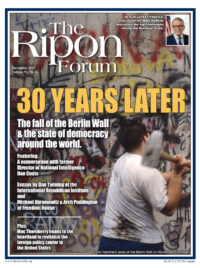
The D.C. Opportunity Scholarship Program is unique in at least one respect: it’s the only school voucher program overseen by Congress. Support for the program, which provides vouchers to children from low-income families to attend a private school of choice, tends to reflect Congressional and White House sentiments toward school choice – a reality that has often made it a political hot potato.
Signed into law during the George W. Bush administration, continually under threat of elimination during the Obama years, and back in favor with the Trump administration, the D.C. OSP has put school choice in the national spotlight since its inception in 2004. Regardless of who lives at 1600 Pennsylvania Avenue or the partisan makeup of Congress, the OSP deserves vigorous support. It has helped thousands of children in the nation’s capital, providing access to a safe and effective education that would have otherwise been out of reach.
Today, more than 1,600 students are using a scholarship to attend a private school of choice through the D.C. OSP. Forty-three percent of those children are from families receiving SNAP or TANF benefits, with the average household income sitting at just over $23,000 for a family of four. Over 90 percent of program participants identify as black or Hispanic.
Today, more than 1,600 students are using a scholarship to attend a private school of choice through the D.C. OSP.
Providing education choice for these families has been critical. Just 20 percent of eighth-graders in D.C. Public Schools can read and do math proficiently; the adjusted cohort graduation rate (meaning those students who received a high-school diploma four years after entering ninth grade) was 67 percent in 2019.
Another unfortunate recurring theme in D.C. is school safety. More than 15 percent of high-school students report being in a physical fight on school property, 10 percent were threatened with a deadly weapon, and 30 percent of middle-schoolers report being bullied at school.
For all program participants – but especially for these students – school choice has been a lifeline.
When Congress established the D.C. OSP in 2003, policymakers mandated that researchers periodically evaluate the program, using the strongest research design available. Since 2007, the Institute of Education Sciences (IES) at the U.S. Department of Education has done so using randomized controlled trial (RCT) methods, publishing its most recent report this year.
Researchers have conducted two separate evaluations to date. In the first one, conducted from 2007 through 2010, researchers found that the OSP produced null effects on student math achievement – meaning no differences between program participants and the control group in math – but found positive impacts on reading achievement for participants.
That evaluation also found that parents of scholarship students perceived their child’s new school to be less dangerous than their prior school. And most notably, the evaluation found large, significant impacts on academic attainment, with voucher use increasing participants’ probability of graduating high school by 21 percentage points.
The second evaluation, conducted from 2017 through 2019, initially found negative effects on student math achievement among OSP students. However, by the 2019 evaluation, students using a scholarship to attend a private school had caught up to their non-scholarship peers, with any negative impacts on mathematics achievement disappearing completely. That same congressionally mandated year-three evaluation also found that OSP participation reduced student absenteeism, increased students’ satisfaction with their school, and improved feelings of school safety among students.
Those outcomes are made more notable when considering they come at a fraction of the cost: approximately one-third of what is spent in D.C. Public Schools. Spending per pupil in D.C. Public Schools exceeds $27,000 per child, per year. The maximum scholarship award is $8,857 in K-8 and $13,287 for high school. Compounded over time, taxpayers spend $351,000 per child in D.C. Public Schools to get that child from kindergarten to graduation. They spend a little more than one-third of that—$132,861—to graduate a student through the OSP.
Taxpayers spend $351,000 per child in D.C. Public Schools to get that child from kindergarten to graduation. They spend a little more than one-third of that—$132,861—to graduate a student through the OSP.
Despite this, the OSP faces an uncertain future. Since Congress enacted the scholarship program, participation among private schools (meaning private schools that accept a voucher as payment for tuition) has fallen from a peak of 68 schools during the 2005-06 school year to just 48 schools today – a 30 percent reduction.
Reduced school participation is likely due to a combination of regulatory creep, fear of future regulations, and financial uncertainty caused by the annual congressional appropriations process. Most reauthorizations of the program have included new regulations on participating schools, leading them to conform more and more to the model of the public school system.
Regulations should be limited to address the issue of declining school participation. Although there are an estimated 97 private schools in the District (not including pre-K-only schools), just 48 currently participate in the program, accepting students on a scholarship. At least 22 operational private schools in the District could be participating in the Opportunity Scholarship Program, but aren’t doing so.
At the same time, Congress should set the D.C. OSP on stable footing for the future by establishing a dedicated scholarship revenue stream through formula funding for the program and by expanding eligibility to more District residents. These updates would provide stability to participating children and private schools and allow the D.C. OSP to be a model school choice program for the country.
Lindsey M. Burke, Ph.D., is the Director of the Center for Education Policy and Will Skillman Fellow in Education at The Heritage Foundation.




